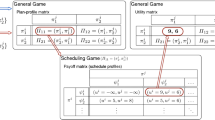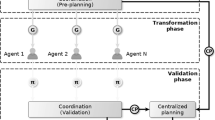Abstract
A new integrated architecture for distributed planning and scheduling is proposed that exploits constraints for problem decomposition and coordination. The goal is to develop an efficient method to solve densely constrained planning/scheduling problems in a distributed manner without sacrificing solution quality. A prototype system (CAMPS) was implemented, in which a set of intelligent agents try to coordinate their actions for ‘satisfying’ planning/scheduling results by handling several intra- and inter-agent constraints. The repair-based methodology for distributed planning/scheduling is described, together with the constraint-based mechanism of dynamic coalition formation among agents.
Similar content being viewed by others
References
Decker, K. S., Durfee, E. H. and Lesser, V. R. (1989) Evaluating research in cooperative distributed problem solving, in Dis-tributed Artificial Intelligence, Vol.2, Gasser, L. and Huhns, M. N. (eds), Pitman, London, pp.485–519.
Gasser, L. and Hill, R. W. (1990) Engineering coordinated problem solvers. Annual Review of Computer Science, 4, 203–253.
Hirayama, K. and Toyoda, J. (1995) Forming coalitions for breaking deadlocks, in Proceedings of the First International Conference on Multi-Agent Systems,San Francisco, CA, AAAI, pp. 155–162.
Lesser, V. R. and Corkill, D. D (1987) Distributed problem solving, in Encyclopedia in Artificial Intelligence, Shapiro, S. C. (ed.), Wiley, New York.
Liu, J. (1996) Coordination of multiple agents in distributed manufacturing scheduling, PhD Thesis, Carnegie Mellon University, Pittsburgh, PA.
Minton, S., Johnston, M. D., Philips, A. B. and Laird, P. (1990) Solving large-scale constraint satisfaction and scheduling problems using a heuristic repair method, in Proceedings of the Eighth National Conference on Artificial Intelligence, Boston, MA, AAAI, pp. 17–24.
Miyashita, K. and Sycara, K. (1995) CABINS: a framework of knowledge acquisition and iterative revision for schedule improvement and reactive repair. Artificial Intelligence, 76 (1–2), 377–426.
Neiman, D. E., Hildum, D. W. and Lesser, V. R. (1994) Exploi-ting meta-level information in a distributed scheduling system, in Proceedings of the Twelfth National Conference on Artificial Intelligence, Seattle, WA, AAAI, pp.394–400.
Sycara, K. P., Roth, S. F., Sadeh, N. and Fox, M. S. (1991) Resource allocation in distributed factory scheduling.IEEE Expert, 6(1), 29–40.
Yokoo, M., Durfee, E. H., Ishida, T. and Kuwabara, K. (1992) Distributed constraint satisfaction for formalizing distribut-ed problem solving, in Proceedings of the Twelfth Interna-tional Conference on Distributed Computing Systems, pp. 614–621.
Zweben, M., Davis, E., Daun, B. and Deale, M. (1992) Re-scheduling with iterative repair, in Proceedings of AAAI-92 Workshop on Production Planning, Scheduling and Control, San Jose, CA, AAAI.
Author information
Authors and Affiliations
Rights and permissions
About this article
Cite this article
Miyashita, K. CAMPS: a constraint-based architecturefor multiagent planning and scheduling. Journal of Intelligent Manufacturing 9, 147–154 (1998). https://doi.org/10.1023/A:1008867912869
Issue Date:
DOI: https://doi.org/10.1023/A:1008867912869




